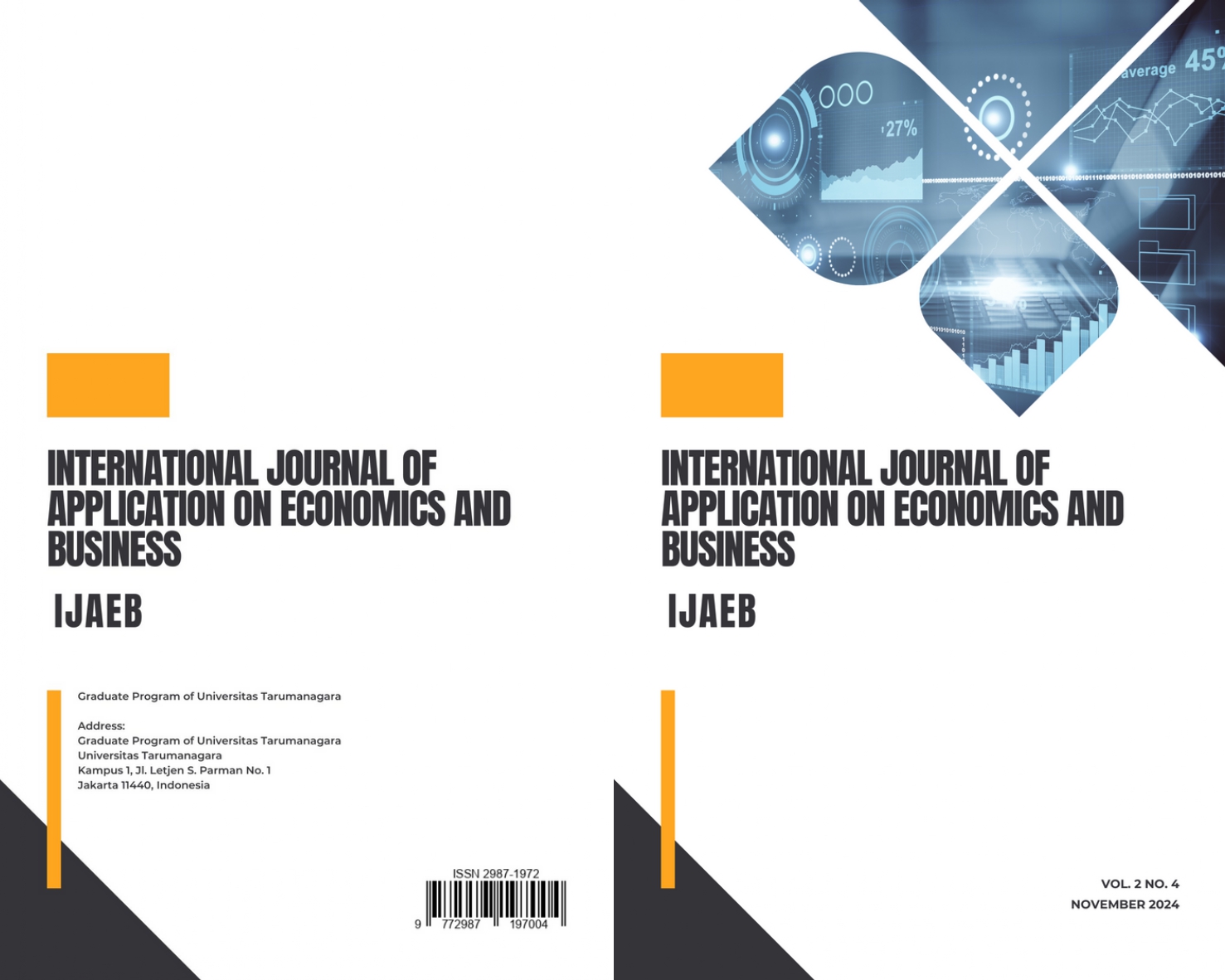DETERMINANT OF NGM’S INTENTION TO CONTINUE THE FAMILY BUSINESS
Main Article Content
Abstract
Family businesses encounter succession crisis, with only 10% to 15% successfully transitioning to the third generation. The sustained operation and growth of family enterprises are intricately linked to the effectiveness of generational transitions. The absence of a structured transition process in family business continuity often stems from the insufficient interest and commitment of the Next Generation Members (NGM) to perpetuate their family enterprises. Hence, there is a pressing need for research into the determinants influencing NGM's intentions to sustain family businesses. This study investigates and evaluates the impacts of career interest, self-efficacy, and parental support on NGM's intentions to continue family businesses. Employing a non-probability sampling technique, data is collected through an online Google Form questionnaire from 121 respondents. Data analysis is conducted using SmartPLS. The study sample comprises NGMs based in Jakarta. The findings revealed that career interest positively and significantly shaped NGM's intentions to continue family businesses, self-efficacy similarly exerts a positive and significant impact, while parental support yields a negative and non-significant effect on NGM's intentions to continue family businesses. The results of this study provide information for family business owners in preparing for business succession in the future.
Article Details
Section

This work is licensed under a Creative Commons Attribution-NonCommercial-ShareAlike 4.0 International License.
This journal provides immediate open access to its content on the principle that making research freely available to the public supports a greater global exchange of knowledge.
IJAEB by Graduate Program of Universitas Tarumanagara is licensed under a Creative Commons Attribution-NonCommercial-ShareAlike 4.0 International License.. Permissions beyond the scope of this license may be available at https://journal.untar.ac.id/index.php/ijaeb
References
Anggadwita, G., Profityo, W. B., Alamanda, D. T., & Permatasari, A. (2020). Cultural Values and Their Implications to Family Business Succession. Journal of Family Business Management. 10(4). 281-292. https://doi.org/10.1108/JFBM-03-2019-0017
Antonius, A., & Utama, L. (2023). The Effect of Creativity and Self-Efficacy on the Performance of Culinary MSMEs with Entrepreneurship Orientation as Mediation. International Journal of Application on Economics and Business.1(1). 162-171. https://doi.org/10.24912/ijaeb.v1i1.162-171
Canosa, M. L. G., Tinoco, F. O., Segura, J. L. C., Delorme, C. K., & Laverde, F. P. (2021). Is It Because I Can or Because of Who I Am? The Moderating Effect of Entrepreneurs’ Social Identity on Entrepreneurial Self-Efficacys’ – Entrepreneurial Intention Relationship. Journal of Technology Management & Innovation. 1694). 46-56. http://dx.doi.org/10.4067/S0718-27242021000400046
Chan, F., Jalandoni, D., Sayarot, C.A., Uy, M., Daradar, D., & Aure, P. (2020). A Family Affair: A Quantitative Analysis of Third-Generation Successors’ Intentions to Continue the Family Business. 11(2). 462-481. https://doi.org/10.15388/omee.2020.11.43
Cieslik, J. & Stel, A. V. (2017). Explaning University Students’ Career Path Intentions from Their Current Entrepreneurial Exposure. Journal of Small Business and Entreprise Development. 24(2). 313-332. https://doi.org/10.1108/JSBED-09-2016-0143
Garcia, P. R. J. M., Sharma, P., Massis, A. D., Wright, M., & Scholes, L. (2018). Perceived Parental Behaviors and Next-Generations Engagement in Family Firms: a Social Cognitive Perspective. 1- 37. https://doi.org/10.1177/1042258718796087
Georgescu, M. A. & Herman, E. (2020). The Impact of the Family Background on Students’ Entrepreneurial Intentions: An Empirical Analysis. 12. 1-18. https://doi.org/10.3390/su12114775
Hasan, M., Hatidja, S., Rasyid, A., Nurjanna., Walenta, A. S., Tahir, J., & Haeruddin, M. (2020). Entrepreneurship Education, Intention, and Self Efficacy: an Examination of Knowledege Transfer within Family Businesses. 8(1 September). 526-539. https://doi.org/10.9770/jesi.2020.8.1(37)
Hogan, G. (2012). A Study of the Motivational Factors that Influence Next-Generation Members to Lead Their Family-Owned Business. 1-189.
Hurst, J. L. & Good, L. K. (2009). Generation Y and Career Choice: The Impact of Retail Career Perceptions, Expectations and Entitlement Perceptions. 14(6). 570-593. https://doi.org/10.1108/13620430910997303
Kasemaa, A. (2016). The Adaptation of the Motivation to Lead Instrument to the Estonian Military Context. Journal of Management and Business Administration. 24(1). 64-88. https://doi.org/10.7206/jmba.ce.2450-7814.164
Oliveira, I. M., Porfeli, E. J., Taveira, M. D. C., & Lee, B. (2020). Children’s Career Expectations and Parents’ Jobs: Intergenerational (Dis)continuities. 68. 63-77. https://doi.org/10.1002/cdq.12213
Ong, K. J., Chou, Y. C., Yang, D. Y., & Lin, C. C. (2020). Creative Drama in Science Education: The Effects on Situational Interest, Career Interest, and Science-Related Attitudes of Science Majors and Non-Science Majors. EURASIA Journal of Mathematics, Science and Technology. 16(4). 1-19. https://doi.org/10.29333/ejmste/115296
Pignault, A., Vayre, E., & Housesemand, C. (2022). 14. What Do They Want from a Career? University Students’ Future Career Expectations and Resources in a Health Crisis Context. 14. 1- 18. https://doi.org/10.3390/su142416406
Romani, G., Barreto, K. S., Marin, G. H., Escorcia, R. R., & Rueda, J. (2021). Not Like My Parents! The Intention to Become a Successor of Latin American Students with Entrepreneur Parents. 1-25. https://doi.org/10.3390/su14031193
Santoso, S. (2016). Influence of Self-Efficacy to Student Entrepreneurial-Intention with Student Background as a Moderating Variable: Case Study in Indonesia. International Journal of Information, Business and Management. 8(4). 131-145.
Saunia, S. & Hidayah, N. (2023). Family Role, Experiences Exposure, and Entrepreneurial Judgment Skills Toward Start-Up Entrepreneurs’ Productivity. International Journal of Applications on Economics and Business. 1(1). 539-546. https://doi.org/10.24912/ijaeb.v1i1.539-546
Suhartanto, E. (2022). The mediating effect of family business self-efficacy on parental support and succession intention relationship. Journal of Family Business Management. 1-18. https://doi.org/10.1108/JFBM-03-2022-0035
Wang, D., & Zhang, Z. (2021). Disassembling the Influences of Perceived Family Relational Conflict on Business Family Offspring’s Intrapreneurial Intentions. International Entrepreneurship and Management Journal. 18. 153-189. https://doi.org/10.1007/s11365-021-00747-5
Zhang, J., Zhao, C., Li, F., Wang, X., Xu, H., Zhou, M., Huang, Y., Yang, Y., Yu, G., & Zhang, G. (2023). Longitudinal Relationships among Career Adaptability, Resilience, and Career Commitment in Chinese Cursing Undergraduates: Testing Differences in Career Interest between Cross-Lagged Models. 22.1-11. https://doi.org/10.1186/s12912-023-01224-w
Zhu, F., & Zhou, H. (2022). Perceived Parental Care and Next-Generation Family Members’ Succession Intentions: The Sequential-Mediating Role of General Self-Efficacy and Perceived Person-

